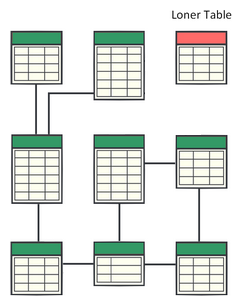This query listed tables that have no foreign keys, meaning they are not referencing any table or are not on the "many" side of FK.
Query below lists something a little different - tables that are not referencing and are not referenced by other tables. Something I called Loner Tables. This diagram illustrates the concept:

Query
select count(*) [table_count],
sum(case when fks.cnt + refs.cnt = 0 then 1 else 0 end)
as [loner_tables],
cast(cast(100.0 * sum(case when fks.cnt + refs.cnt = 0 then 1 else 0 end)
/ count(*) as decimal(36, 1)) as varchar) + '%' as [loner_ratio]
from (select schema_name(tab.schema_id) + '.' + tab.name as tab,
count(fk.name) cnt
from sys.tables as tab
left join sys.foreign_keys as fk
on tab.object_id = fk.parent_object_id
group by schema_name(tab.schema_id), tab.name) fks
inner join
(select schema_name(tab.schema_id) + '.' + tab.name as tab,
count(fk.name) cnt
from sys.tables as tab
left join sys.foreign_keys as fk
on tab.object_id = fk.referenced_object_id
group by schema_name(tab.schema_id), tab.name) refs
on fks.tab = refs.tab
Columns
- table_count - number of tables in database
- loner_tables - number of Loner Tables in the database
- loner_ratio - Loner Ratio - % of Loner Tables in the database
Rows
- Scope of rows: query returns one row
Sample results
Loner Ratio in AdventureWorks sample database is 6.9%, meaning that 6.9% of tables are not related by foreign keys to any other table.












 Piotr Kononow
Piotr Kononow